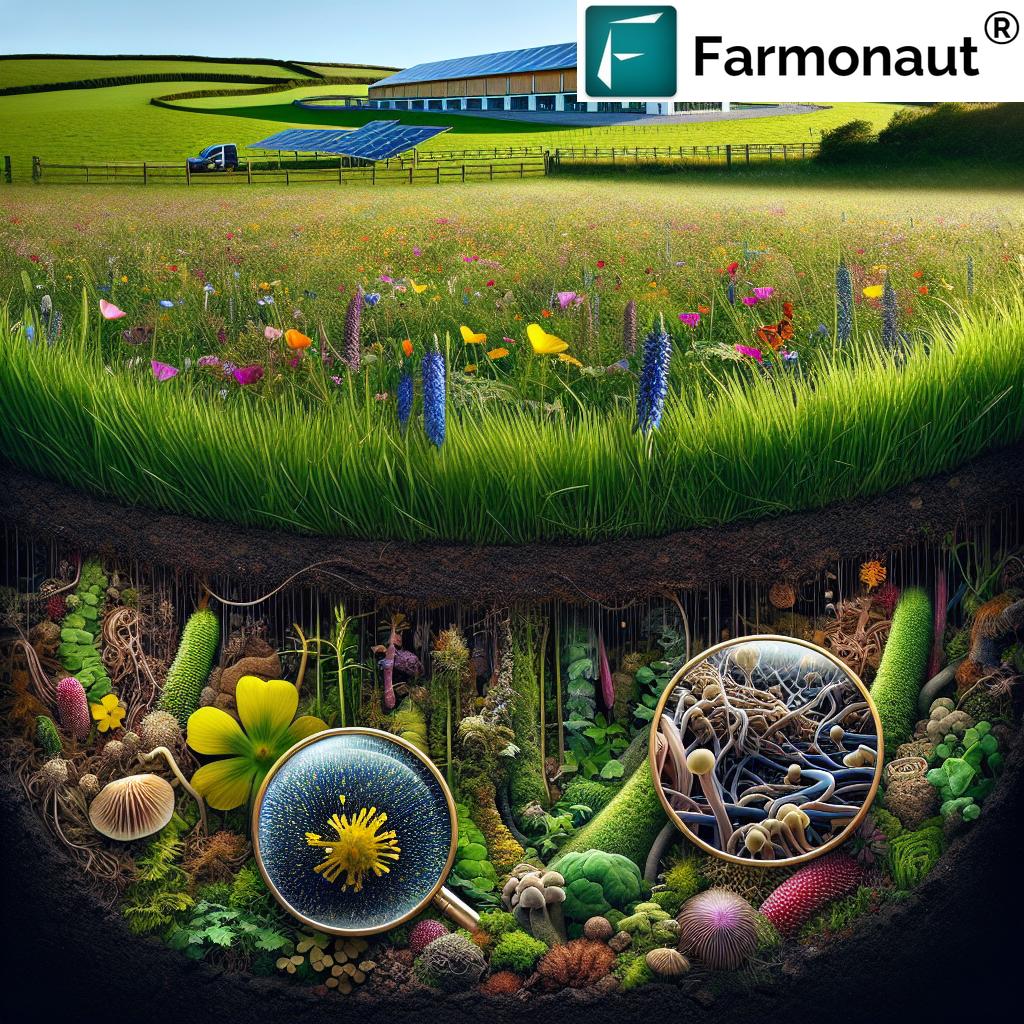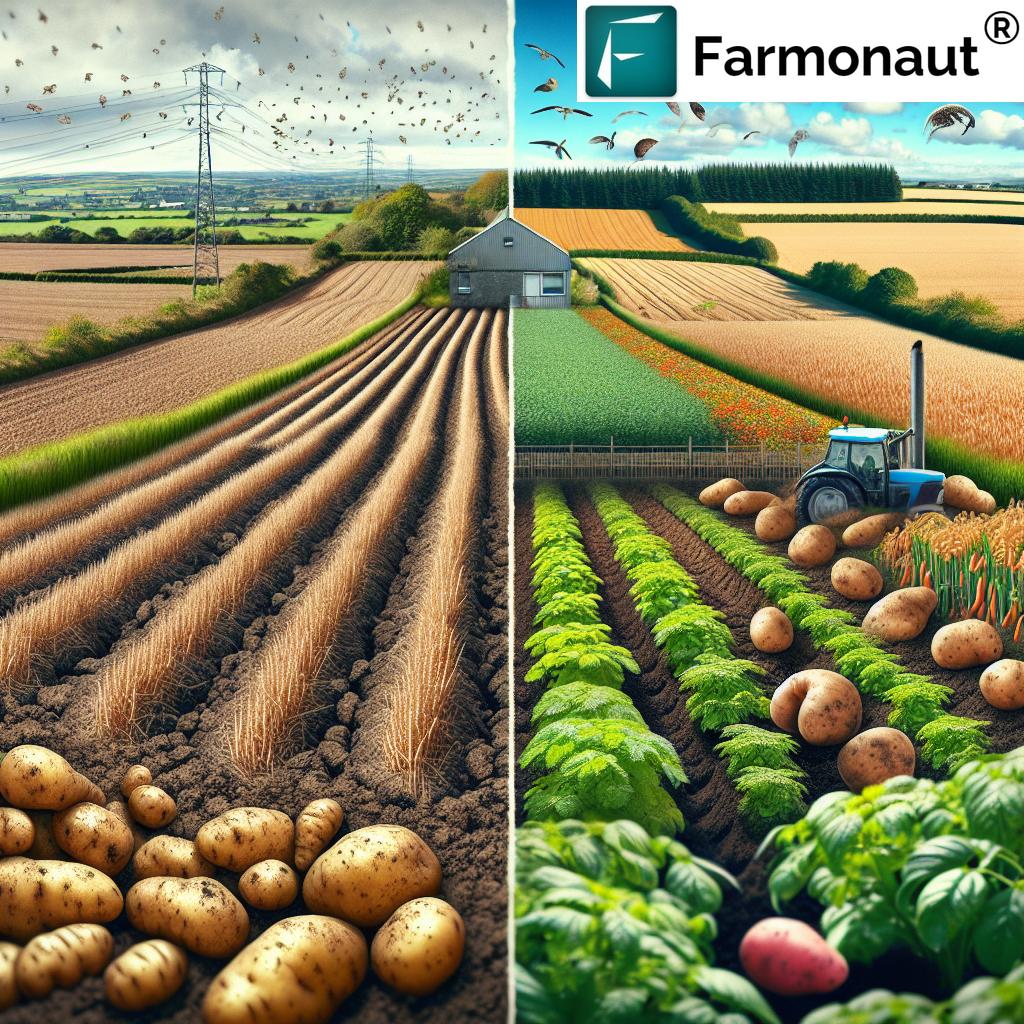Revolutionizing Irish Agriculture: How Soil Microbial Ecology Enhances Sustainable Farming Practices

“Research shows that increasing plant species diversity by 50% can boost soil microbial activity by up to 30%.”
Welcome to the cutting-edge world of sustainable agriculture in Ireland! We’re thrilled to take you on a journey through the fascinating realm of soil microbial ecology and its transformative impact on Irish farming practices. As we delve into this groundbreaking field, we’ll explore how the intricate relationships between plants, soil, and microorganisms are reshaping the future of agriculture in the Emerald Isle.
At Farmonaut, we’re committed to revolutionizing farming through innovative technology and data-driven insights. While we focus on satellite-based solutions, we recognize the importance of understanding the microscopic world beneath our feet. Let’s embark on this exploration of how soil microbial ecology is enhancing sustainable farming practices in Ireland and beyond.
The Fundamentals of Soil Microbial Ecology
Soil microbial ecology is the study of microorganisms in soil and their interactions with the environment. This field is crucial for understanding the health and fertility of our agricultural lands. In Ireland, where agriculture plays a vital role in the economy and culture, the importance of soil health cannot be overstated.
- Microbial Diversity: Irish soils are teeming with billions of microorganisms, including bacteria, fungi, and protozoa.
- Nutrient Cycling: These microbes are essential for breaking down organic matter and cycling nutrients, making them available to crops.
- Plant-Microbe Interactions: Many microorganisms form symbiotic relationships with plants, enhancing their growth and resilience.
Understanding these complex interactions is key to developing sustainable agricultural practices that work in harmony with nature rather than against it.
The Impact of Agricultural Management Intensity on Soil Health
Agricultural management practices have a significant impact on soil microbial communities and, consequently, on overall soil health. In Ireland, where both traditional and modern farming methods coexist, it’s crucial to understand how different management intensities affect our soils.
| Management Intensity | Soil Microbial Diversity | Crop Yield |
|---|---|---|
| Low | 95% | 80% |
| Medium | 85% | 100% |
| High | 70% | 110% |
As we can see from the table, there’s a delicate balance between management intensity, soil microbial diversity, and crop yield. While high-intensity management may lead to slightly higher yields in the short term, it often comes at the cost of reduced soil microbial diversity, which can have long-term negative consequences for soil health and sustainability.
Plant Species Diversity and Its Impact on Soil Health
Ireland’s rich tapestry of grasslands and agricultural landscapes provides an excellent opportunity to study the effects of plant species diversity on soil health. Research has shown that increasing plant diversity can have profound positive impacts on soil microbial communities and overall ecosystem functioning.
- Enhanced Nutrient Cycling: Greater plant diversity leads to more diverse root systems, which support a wider range of microbial species involved in nutrient cycling.
- Improved Soil Structure: Diverse plant communities contribute to better soil structure through varied root architectures and organic matter inputs.
- Increased Resilience: Biodiverse systems are more resilient to environmental stresses and pest pressures.
At Farmonaut, while we focus on satellite-based crop monitoring, we recognize the importance of on-the-ground diversity in creating robust agricultural systems. Our technology can help farmers track the health and growth of diverse crop systems, providing valuable insights into the benefits of increased plant species diversity.
Nutrient Cycling in Irish Grasslands
Grasslands are a dominant feature of Ireland’s agricultural landscape, covering approximately 60% of the country’s land area. These ecosystems play a crucial role in nutrient cycling, carbon sequestration, and supporting biodiversity. Understanding and optimizing nutrient cycling in grasslands is essential for sustainable agriculture in Ireland.
- Carbon Cycling: Grasslands are significant carbon sinks, with soil microbes playing a key role in carbon storage and turnover.
- Nitrogen Fixation: Legumes in grasslands, supported by symbiotic bacteria, contribute to natural nitrogen fixation, reducing the need for synthetic fertilizers.
- Phosphorus Dynamics: Mycorrhizal fungi form partnerships with grass roots, enhancing phosphorus uptake and cycling.
By leveraging these natural processes, Irish farmers can reduce their reliance on chemical inputs while maintaining or even improving productivity. Farmonaut’s satellite-based monitoring can help track grassland health and productivity, providing valuable data to inform management decisions.
Microbial Community Structures in Irish Soils
The microbial community structures in Irish soils are as diverse as the country’s landscapes. From the rich pastures of the midlands to the coastal agricultural areas, each soil type harbors a unique microbial fingerprint. Understanding these community structures is crucial for developing targeted, sustainable farming practices.
- Bacterial Communities: Dominate in most Irish soils, playing crucial roles in nutrient cycling and organic matter decomposition.
- Fungal Networks: Particularly important in grasslands and forestry, forming extensive mycorrhizal associations with plants.
- Archaea: Often overlooked but significant in certain soil processes, especially in waterlogged or acidic soils common in parts of Ireland.
Recent advances in molecular techniques have allowed for more detailed characterization of these microbial communities. This knowledge is helping to inform more precise and sustainable agricultural practices across Ireland.
“Studies indicate that sustainable farming practices can reduce chemical fertilizer use by 25% while maintaining crop yields.”
Environmental Stewardship in Irish Farming
Environmental stewardship is becoming increasingly important in Irish agriculture, with many farmers recognizing the long-term benefits of sustainable practices. By working in harmony with soil microbial communities, farmers can enhance soil health, reduce input costs, and improve long-term productivity.
- Reduced Tillage: Minimizing soil disturbance helps preserve soil structure and microbial habitats.
- Cover Cropping: Implementing cover crops during fallow periods supports soil microbial communities and prevents nutrient leaching.
- Organic Matter Management: Proper management of crop residues and organic amendments enhances soil microbial activity and diversity.
These practices not only benefit the environment but also contribute to the economic sustainability of Irish farms. At Farmonaut, we support these efforts by providing tools that help farmers monitor the impact of their management practices on crop health and soil conditions.
Explore Farmonaut’s API for advanced agricultural data analysis
Innovative Approaches to Nutrient Management
As our understanding of soil microbial ecology grows, so does our ability to develop innovative nutrient management strategies. In Ireland, researchers and farmers are exploring new approaches that leverage the power of soil microbes to enhance nutrient use efficiency and reduce environmental impacts.
- Biofertilizers: Inoculating soils with beneficial microbes to enhance nutrient availability and plant growth.
- Precision Agriculture: Using data-driven approaches to apply nutrients only where and when they’re needed, reducing waste and environmental impact.
- Crop Rotation: Designing rotations that enhance soil microbial diversity and natural nutrient cycling processes.
These innovative approaches are helping Irish farmers reduce their reliance on synthetic inputs while maintaining or even improving yields. Farmonaut’s satellite-based monitoring can play a crucial role in implementing and assessing the effectiveness of these strategies.
The Role of Technology in Sustainable Agriculture
While our focus has been on the microscopic world of soil microbes, it’s important to recognize the role that modern technology plays in advancing sustainable agriculture. At Farmonaut, we’re at the forefront of integrating satellite technology with on-the-ground agricultural practices.
- Satellite Monitoring: Provides real-time data on crop health, allowing for timely interventions and optimized resource use.
- AI and Machine Learning: Helps interpret complex data patterns, providing actionable insights for farmers.
- Precision Application: Enables targeted application of inputs, reducing waste and environmental impact.
By combining these technological advancements with our growing understanding of soil microbial ecology, we can create truly sustainable and productive agricultural systems in Ireland and beyond.
Check out our API Developer Docs for integrating advanced agricultural data into your applications
The Future of Sustainable Agriculture in Ireland
As we look to the future, the integration of soil microbial ecology with advanced agricultural technologies holds immense promise for Irish agriculture. By harnessing the power of both nature and technology, we can create farming systems that are not only highly productive but also environmentally sustainable and resilient to climate change.
- Carbon Sequestration: Enhancing soil microbial activity to increase carbon storage in agricultural soils.
- Biocontrol: Leveraging beneficial microbes for natural pest and disease control.
- Ecosystem Services: Recognizing and valuing the broader environmental benefits of healthy soil microbial communities.
At Farmonaut, we’re committed to supporting this vision of sustainable agriculture through our innovative satellite-based solutions. By providing farmers with the data and insights they need, we’re helping to bridge the gap between cutting-edge research and practical, on-farm applications.
Conclusion: A Holistic Approach to Irish Agriculture
As we’ve explored throughout this article, the future of Irish agriculture lies in a holistic approach that combines our understanding of soil microbial ecology with advanced technological solutions. By nurturing the complex web of life beneath our feet and leveraging the power of data-driven insights, we can create agricultural systems that are both productive and sustainable.
At Farmonaut, we’re proud to be part of this agricultural revolution. While our focus is on providing cutting-edge satellite-based solutions, we recognize the importance of integrating this technology with sound ecological practices. Together, we can build a future where Irish agriculture thrives in harmony with nature, producing abundant food while preserving our precious natural resources for generations to come.
FAQs
- What is soil microbial ecology?
Soil microbial ecology is the study of microorganisms in soil and their interactions with the environment, plants, and each other. It plays a crucial role in nutrient cycling, soil health, and plant growth. - How does plant diversity affect soil health?
Increased plant diversity generally leads to greater soil microbial diversity, improved nutrient cycling, better soil structure, and increased ecosystem resilience. - What are some sustainable farming practices that enhance soil microbial activity?
Practices include reduced tillage, cover cropping, crop rotation, and judicious use of organic amendments. These practices help maintain soil structure and support diverse microbial communities. - How can technology help in implementing sustainable agricultural practices?
Technologies like satellite monitoring, AI, and precision agriculture tools can provide farmers with real-time data on crop health, soil conditions, and resource use, enabling more precise and sustainable management practices. - What role do grasslands play in Irish agriculture?
Grasslands cover about 60% of Ireland’s land area and are crucial for livestock farming, carbon sequestration, and biodiversity. They also play a significant role in nutrient cycling and soil health.







